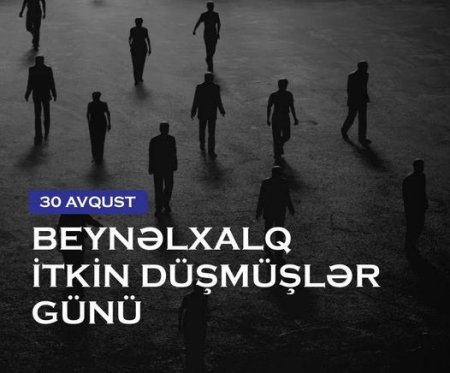Today marks the International Day of the Disappeared, established by the UN General Assembly on December 21, 2010. This significant day sheds light on the issue of missing persons, often resulting from forced abductions during acts of terrorism, political conflicts, or oppressive regimes. Regrettably, the phenomenon of forced kidnapping has evolved into a global concern.
The primary objective of commemorating this day is to raise public awareness regarding the plight of missing individuals whose fundamental rights have been violated. On the International Day of Missing Persons, member states, in collaboration with numerous international and non-governmental organizations, organize diverse events aimed at drawing universal attention to the predicament of the missing.
In light of recent information from the State Commission on Prisoners and Missing Hostages of the Republic of Azerbaijan, it has come to our attention that during the First Karabakh War, Armenia's military aggression against Azerbaijan resulted in the registration of 3,890 Azerbaijani citizens as missing persons. This distressing tally comprises 3,171 military personnel and 719 civilians, including 71 minors, 267 women, and 326 elderly individuals.
Out of the total number of missing persons, 872, including 29 children, 98 women, and 112 elderly citizens, were either taken hostage or remained in the occupied territories. Subsequent to their release, former prisoners and hostages confirmed sightings of these individuals still alive. However, throughout the entire conflict, Armenia concealed information about these persons from international organizations and refrained from providing insights into their subsequent fates.
Notably, representatives from the International Committee of the Red Cross (ICRC) were able to meet with 54 of the missing persons during the First Karabakh War while they were in Armenian custody, with 17 of them later having their remains handed over. For 33 others, information was provided about their demise, yet their remains were not returned, and details about the fate of 4 individuals remain elusive.
During the initial Karabakh conflict, 1,480 Azerbaijanis were released from Armenian captivity, and 183 bodies were exhumed from the graves of 191 unidentified martyrs scattered across 21 cemeteries in 13 cities and regions of the republic.
At present, efforts continue to locate 6 Azerbaijani servicemen who remain missing from the Patriotic War. It is crucial to acknowledge that Armenia, during its military aggression against Azerbaijan, violated numerous international legal norms, including those established by international humanitarian law. Tragically, the civilian population was not spared; many were taken hostage, and in numerous cases, they met untimely ends, often after enduring unimaginable torture. Shockingly, their bodies were not returned to the Azerbaijani side, further obscuring the evidence of their ordeal.
Azerbaijan remains steadfast in its commitment to uphold international law and national legislation in addressing the concerns of missing citizens and their families. The State Commission on Prisoners and Missing Hostage Citizens, operating within the country, takes comprehensive measures to repatriate those captured or held hostage, search for missing persons, and coordinate the activities of relevant state entities, public and international organizations. Furthermore, the commission diligently collects, registers, and systematizes information pertaining to captured and missing citizens while fulfilling other duties assigned to it by law.
Today marks the International Day of the Disappeared



